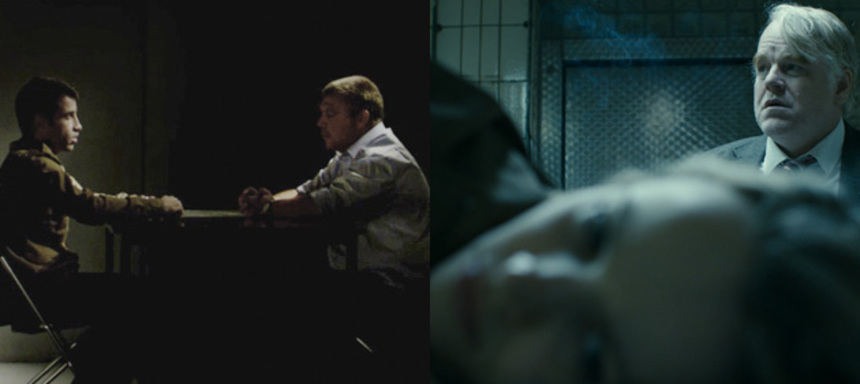Sundance 2014 Dispatch: GREEN PRINCE and A MOST WANTED MAN

Yet two films at Sundance this year occupy similar kinds of moral space. The fact that one is a documentary, and one a fiction film based on a novel written soon after 9/11, makes the connection in some ways even more remarkable.
Green Prince tells the story of a unique connection between two men. Mosab Hassan Yousef is the son of one of the founders of the Palestinian militant group Hamas. Arrested at the age of 17, he placed under the protection of Shin Bet, the Israeli equivalent of the CIA or MI6. There he meets his handler, Gonen Ben Yitzchak, who eventually turns him into a critical informant for the Israelis.
It wouldn't do justice to the film to detail the back-and-forths that take place after this initial encounter, for much of the pleasure from the work delves from the surprise. Suffice it to say, there has rarely been a work, documentary or no, that so thoroughly details both the inner machinations of the Hamas operations, or the interrogation and handling efforts of the hyper secretive Shin Bet.
For those on either side of the Palestinian/Israeli conflict there's much to learn from the film. Just as the Prince must make his way through a moral quagmire, fighting disillusionment at the cost of betrayal, so to does the film portray the situation in its many facets and complexities.
Shot with a stark, almost noir look, the talking head interviews are intercut well, showcasing often the radically different perspectives each participant brings to the table. Yet it is their shared goals that are the most remarkable - it's easy, after all, to peg in the Middle East the many differences, much harder to find deep and abiding connections and similarities under the facade of conflict.
In a fictional setting, A Most Wanted Man takes a similar tack, the betrayal of fathers in order to make what is for the sons a morally superior choice. Here we have two sons, one of a Russian military officer, one a spokesperson for Muslim charitable organizations, and we see how each much make a similar choice to that of the Green Prince in order to choose a better path.
Anton Corbijn is perhaps best known as a photographer, having shot many iconic album covers, and here he brings his artistic eye to another post-cold war spy setting. Like his previous film The American, Corbijn's film feels a bit like a throwback, a deliberate and quiet film that nonetheless has loads of impact. With the likes of Rachel McAdams, Robin Wright and Willem Dafoe, we get a whole bunch of heavy hitting performances, providing the kind of rich drama that films like this thrive on. Yet it is on Philip Seymour Hoffman's shoulders that much of the film sits, and his disheveled, cigarette-fueled German spy character provides another of his inimitable sad-sack characters that he brings to the screen better than pretty much anyone.
I was thinking the film had a very Le Carré vibe to it throughout, though I'm often comparing every spy thriller to Tinker Tailor for better or worse. When I saw that the screenplay by Andrew Bovell was based on one of Le Carré's later works it all kind of made sense. This isn't a Bourne film, this is all about sly glances and moments of procedure, a game of chess between players of different skill sets. As such, it lacks some of the fireworks that might be demanded of an audience, but it also lacks some of the rich, sophisticated character beats that Tinker pulled off so beautifully.
As it stands, but Green Prince and A Most Wanted Man are decent films worth seeing. For me, however, it was this inadvertent synergy that in some ways elevated both, asking similar questions about loyalty versus duty, and how various institutions on either side prove to be more powerful and intractable than any ideology, be it good or ill. Separate, they're fine films, but seen in proximity, they may actually better than the sum of their parts.

Do you feel this content is inappropriate or infringes upon your rights? Click here to report it, or see our DMCA policy.






